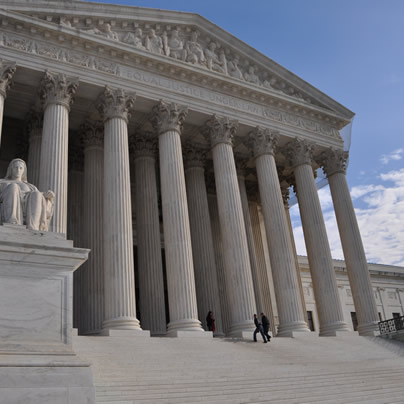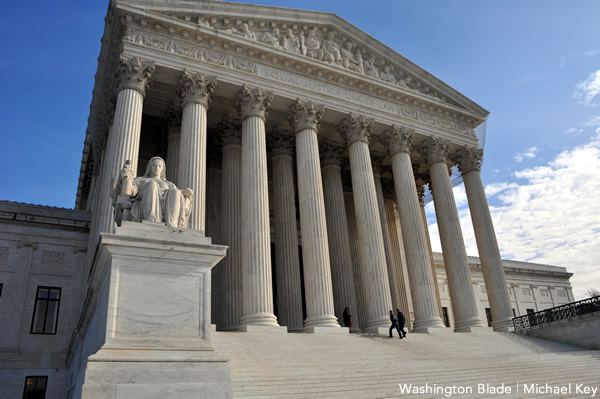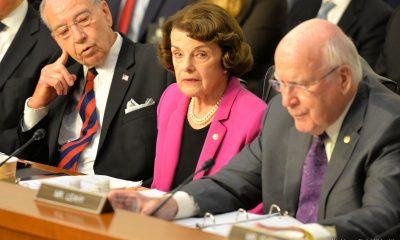National
DOJ calls on Supreme Court to strike down DOMA
Obama administration cites ‘severe harms’ for gay couples


DOJ filed a brief before the Supreme Court arguing DOMA is unconstitutional. (Washington Blade file photo by Michael Key)
The Obama administration on Friday argued that the Defense of Marriage Act should be struck down by the Supreme Court because it “inflicts a vast array of…severe harms” on married same-sex couples.
In a 54-page legal brief, the U.S. Justice Department lays out its case for why it believes Section 3 of DOMA is unconstitutional — noting the harm the law causes married same-sex couples and the history of discrimination against gay and lesbian people — while arguing that DOMA should be subjected to heightened scrutiny, or a greater assumption it’s unconstitutional.
“The law denies to tens of thousands of same-sex couples who are legally married under state law an array of important federal benefits that are available to legally married opposite-sex couples,” the brief states. “Because this discrimination cannot be justified as substantially furthering any important governmental interest, Section 3 is unconstitutional.”
The brief is signed by Solicitor General Donald Verrilli as well as Stuart Delery, the gay principal deputy attorney general who’s litigated against DOMA in oral arguments in lower courts. The lawsuit before the Supreme Court is known as Windsor v. United States, which was filed by the American Civil Liberties Union.
The brief enumerates several benefits that are withheld from married same-sex couples under DOMA, such as the denial of certain housing benefits for service members, the lack of Social Security survivor benefits and the inability of gay Americans to sponsor their foreign-born same-sex spouses for residency in the United States. It also notes plaintiff and New York widower Edith Windsor was forced to pay $363,000 in estate taxes upon the death of her spouse, Thea Spyer.
But the Justice Department also makes the case that laws related to sexual orientation should be subjected to heightened scrutiny because gay people have been subjected to a history of discrimination, citing bias in employment and immigration as well as vulnerability to hate crimes and police harassment.
Additionally, the brief contends DOMA merits heightened scrutiny because sexual orientation bears no relation on an individual’s ability to contribute to society and gays are a minority with limited political power.
“Historically, discrimination against gay and lesbian people had nothing to do with ability or performance, but rested instead on the view that they are, for example, sexual deviants, mentally ill, or immoral,” the brief states. “Like gender, race,or religion, sexual orientation bears no inherent relation to a person’s ability to participate in or contribute to society.”
While asserting DOMA fails the test of heightened scrutiny, the Justice Department says it doesn’t challenge the law if a lower standard of rational basis review were applied. However, even under this standard, the brief maintains the law would fail under a more searching form of that review.
“To the extent sexual orientation may be considered to fall short in some dimension, the history of discrimination and the absence of relation to one’s capabilities associated with this particular classification would uniquely qualify it for scrutiny under an approach that calls for a measure of added focus to guard against giving effect to a desire to harm an ‘unpopular group,'” the brief states. “Section 3 would fail to satisfy any such analysis, largely for the reasons it fails heightened scrutiny.”
In addition to the merits brief, the Justice Department filed on the same day another brief addressing jurisdictional questions in the case. That brief responds to questions over whether the executive branch agrees DOMA is unconstitutional and whether the House Republican-led Bipartisan Legal Advisory Group has standing to participate. BLAG, following a party-line vote of 3-2, has taken up defense of DOMA in the administration’s stead.
In that 38-page brief, the Justice Department contends the Supreme Court has jurisdiction, but BLAG lacks standing to seek review of lower court decisions striking down DOMA.
“BLAG is an entity located within the Legislative Branch,” the brief states. “The Constitution assigns to that Branch only specifically enumerated ‘legislative powers.’ … Although Congress (and the individual Houses) may create offices to assist with legislative tasks, the authority of such an office may not include the ‘discretionary power to seek judicial relief’ on behalf of the United States.”
Also on Friday, other briefs were filed by the ACLU and BLAG in response to the jurisdictional questions in the case. In its brief, BLAG argues it can participate in the lawsuit, but the Justice Department doesn’t have standing to take part.
LGBT advocates have been calling on the Obama administration to file a similar brief in the lawsuit pending before the Supreme Court challenging California’s Proposition 8. As of Thursday, the White House hasn’t said whether the administration will file a brief, although President Obama said the solicitor general is “looking” at such action. The deadline for the Obama administration to file a brief in the case is Thursday.
In the DOMA case, the next step is for the ACLU to file its brief on the merits, which is expected on Tuesday. Oral arguments in the case are set for March 27 and justices are expected to render a decision before their term ends in June.
State Department
State Department releases annual human rights report
Antony Blinken reiterates criticism of Uganda’s Anti-Homosexuality Act

Secretary of State Antony Blinken on Monday once again reiterated his criticism of Uganda’s Anti-Homosexuality Act upon release of the State Department’s annual human rights report.
“This year’s report also captures human rights abuses against members of vulnerable communities,” he told reporters. “In Afghanistan, the Taliban have limited work opportunities for women, shuttered institutions found educating girls, and increasing floggings for women and men accused of, quote, ‘immoral behavior,’ end quote. Uganda passed a draconian and discriminatory Anti-Homosexuality Act, threatening LGBTQI+ individuals with life imprisonment, even death, simply for being with the person they loved.”
Ugandan President Yoweri Museveni last May signed the law, which contains a death penalty provision for “aggravated homosexuality.”
The U.S. subsequently imposed visa restrictions on Ugandan officials and removed the country from a program that allows sub-Saharan African countries to trade duty-free with the U.S. The World Bank Group also announced the suspension of new loans to Uganda.
Uganda’s Constitutional Court earlier this month refused to “nullify the Anti-Homosexuality Act in its totality.” More than a dozen Ugandan LGBTQ activists have appealed the ruling.
Clare Byarugaba of Chapter Four Uganda, a Ugandan LGBTQ rights group, on Monday met with National Security Council Chief-of-Staff Curtis Ried. Jay Gilliam, the senior LGBTQI+ coordinator for the U.S. Agency for International Development, in February traveled to Uganda and met with LGBTQ activists who discussed the Anti-Homosexuality Act’s impact.
“LGBTQI+ activists reported police arrested numerous individuals on the basis of their sexual orientation or gender identity and subjected many to forced anal exams, a medically discredited practice with no evidentiary value that was considered a form of cruel, inhuman, and degrading treatment and could amount to torture,” reads the human rights report.
The report, among other things, also notes Ugandan human rights activists “reported numerous instances of state and non-state actor violence and harassment against LGBTQI+ persons and noted authorities did not adequately investigate the cases.”
Report highlights anti-LGBTQ crackdowns in Ghana, Hungary, Russia
Ghanaian lawmakers on Feb. 28 approved the Promotion of Proper Human Sexual Rights and Ghanaian Family Values Bill. The country’s president, Nana Akufo-Addo, has said he will not sign the measure until the Ghanaian Supreme Court rules on whether it is constitutional or not.
The human rights report notes “laws criminalizing consensual same-sex sexual conduct between adults” and “crimes involving violence or threats of violence targeting lesbian, gay, bisexual, transgender, queer or intersex persons” are among the “significant human rights issues” in Ghana.
The report documents Hungarian Prime Minister Viktor Orbán and members of his right-wing Fidesz party’s continued rhetoric against “gender ideology.” It also notes Russia’s ongoing crackdown against LGBTQ people that includes reports of “state actors committed violence against LGBTQI+ individuals based on their sexual orientation or gender identity, particularly in Chechnya.”
The report specifically notes Russian President Vladimir Putin on July 24 signed a law that bans “legal gender recognition, medical interventions aimed at changing the sex of a person, and gender-affirming care.” It also points out Papua New Guinea is among the countries in which consensual same-sex sexual relations remain criminalized.

The Cook Islands and Mauritius in decriminalized homosexuality in 2023.
The report notes the Namibia Supreme Court last May ruled the country must recognize same-sex marriages legally performed outside the country. The report also highlights the Indian Supreme Court’s ruling against marriage equality that it issued last October. (It later announced it would consider an appeal of the decision.)
Congress requires the State Department to release a human rights report each year.
The Biden-Harris administration in 2021 released a memorandum that committed the U.S. to promoting LGBTQ+ and intersex rights abroad.
The full report can be read here.
National
Same-sex couples vulnerable to adverse effects of climate change
Williams Institute report based on Census, federal agencies

A new report by the Williams Institute at the UCLA School of Law finds that same-sex couples are at greater risk of experiencing the adverse effects of climate change compared to different-sex couples.
LGBTQ people in same-sex couple households disproportionately live in coastal areas and cities and areas with poorer infrastructure and less access to resources, making them more vulnerable to climate hazards.
Using U.S. Census data and climate risk assessment data from NASA and the Federal Emergency Management Agency, researchers conducted a geographic analysis to assess the climate risk impacting same-sex couples. NASA’s risk assessment focuses on changes to meteorological patterns, infrastructure and built environment, and the presence of at-risk populations. FEMA’s assessment focuses on changes in the occurrence of severe weather events, accounting for at-risk populations, the availability of services, and access to resources.
Results show counties with a higher proportion of same-sex couples are, on average, at increased risk from environmental, infrastructure, and social vulnerabilities due to climate change.
“Given the disparate impact of climate change on LGBTQ populations, climate change policies, including disaster preparedness, response, and recovery plans, must address the specific needs and vulnerabilities facing LGBTQ people,” said study co-author Ari Shaw, senior fellow and director of international programs at the Williams Institute. “Policies should focus on mitigating discriminatory housing and urban development practices, making shelters safe spaces for LGBT people, and ensuring that relief aid reaches displaced LGBTQ individuals and families.”
“Factors underlying the geographic vulnerability are crucial to understanding why same-sex couples are threatened by climate change and whether the findings in our study apply to the broader LGBTQ population,” said study co-author Lindsay Mahowald, research data analyst at the Williams Institute. “More research is needed to examine how disparities in housing, employment, and health care among LGBT people compound the geographic vulnerabilities to climate change.”
Read the report
Federal Government
Lambda Legal praises Biden-Harris administration’s finalized Title IX regulations
New rules to take effect Aug. 1

The Biden-Harris administration’s revised Title IX policy “protects LGBTQ+ students from discrimination and other abuse,” Lambda Legal said in a statement praising the U.S. Department of Education’s issuance of the final rule on Friday.
Slated to take effect on Aug. 1, the new regulations constitute an expansion of the 1972 Title IX civil rights law, which prohibits sex-based discrimination in education programs that receive federal funding.
Pursuant to the U.S. Supreme Court’s ruling in the landmark 2020 Bostock v. Clayton County case, the department’s revised policy clarifies that discrimination on the basis of sexual orientation and gender identity constitutes sex-based discrimination as defined under the law.
“These regulations make it crystal clear that everyone can access schools that are safe, welcoming and that respect their rights,” Education Secretary Miguel Cardona said during a call with reporters on Thursday.
While the new rule does not provide guidance on whether schools must allow transgender students to play on sports teams corresponding with their gender identity to comply with Title IX, the question is addressed in a separate rule proposed by the agency in April.
The administration’s new policy also reverses some Trump-era Title IX rules governing how schools must respond to reports of sexual harassment and sexual assault, which were widely seen as imbalanced in favor of the accused.
Jennifer Klein, the director of the White House Gender Policy Council, said during Thursday’s call that the department sought to strike a balance with respect to these issues, “reaffirming our longstanding commitment to fundamental fairness.”
“We applaud the Biden administration’s action to rescind the legally unsound, cruel, and dangerous sexual harassment and assault rule of the previous administration,” Lambda Legal Nonbinary and Transgender Rights Project Director Sasha Buchert said in the group’s statement on Friday.
“Today’s rule instead appropriately underscores that Title IX’s civil rights protections clearly cover LGBTQ+ students, as well as survivors and pregnant and parenting students across race and gender identity,” she said. “Schools must be places where students can learn and thrive free of harassment, discrimination, and other abuse.”
-

 South America4 days ago
South America4 days agoDaniel Zamudio murderer’s parole request denied
-

 Maryland4 days ago
Maryland4 days agoMontgomery County police chief discusses arrest of trans student charged with planned school shooting
-

 Commentary5 days ago
Commentary5 days agoWorld ‘isn’t much different today’
-

 Theater4 days ago
Theater4 days ago‘Amm(i)gone’ explores family, queerness, and faith











